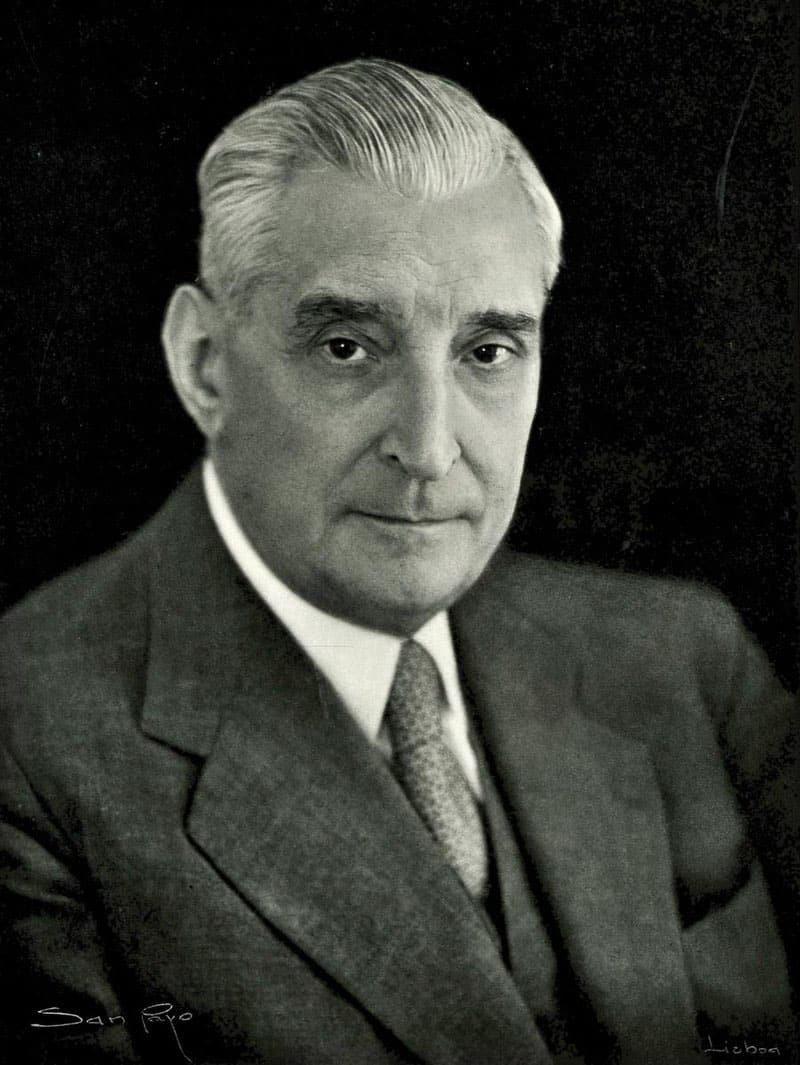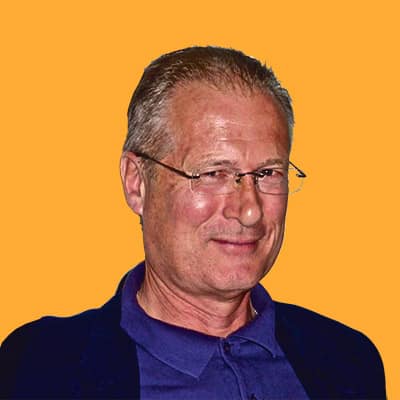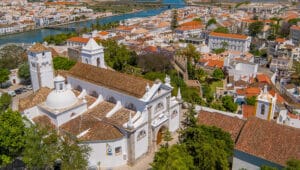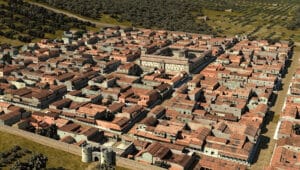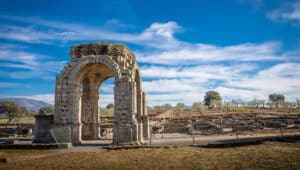The post-war world saw a process of European integration, from which Prime Minister Salazar realised that Portugal could not be excluded.
This realisation was no dramatic conversion for him, but a gradual acceptance of the need for partnership with the rest of Europe, although the evolving European ideal posed a direct threat to his personal authority and to Portugal’s independence.
A federal Europe
Salazar was especially suspicious of the motive power behind the European ideal, and he thought that American diplomacy was responsible.
In a speech of November 1947, Salazar warned that Europe must be aware of the implications of American aid. It was not too late for Europe itself to find the energy for renewal.
Salazar may have been positioning himself to extract the best possible deal from the US in return for the continued use of the Azores air base. In 1948, he took credit for the idea of the creation of a western bloc capable of confronting the USSR, although he saw dangers in a European federation constructed in the American way as a single sovereign state.
It was one thing to accept American aid through the Marshall Plan, but quite another to pool sovereignty. He warned that those who sought to keep the US active in Europe were trading away their countries’ future in return for military protection. But Portugal, by virtue of her geographical position and her treaties, did not have to follow suit.
Portugal and the reconstruction of Europe
By 1945, Salazar had already conceded that foreign investment in Portugal was acceptable. He wrote: “We are nationalists in the economic arena, but we mean by that nationalism only this: the integration of foreign capital and technique in the national economy, without denying their origin and individuality.” Foreign investment was welcome provided it did not upset the prevailing political order.
A serious financial and commercial crisis threatened Western Europe’s war-ravaged economy at a time when Eastern Europe was under the control of USSR. USA was forced to intervene through the European Recovery Plan (ERP), better known as the Marshall Plan.
An important American stipulation was that the Europeans had to cooperate in the application of funds made available by Washington and the Organisation for European Economic Cooperation (OEEC) was created in 1948.
Despite Salazar’s misgivings, Portugal was involved from the very beginning as a founder member of OEEC, although Portuguese representatives maintained that Portugal did not need foreign aid, and saw their country as a potential donor, alongside USA and Switzerland.
Like the rest of Europe, however, Portugal desperately needed a resumption of international commerce, and her representative became one of the 16 in Paris in April 1948 as OEEC was founded.
The Marshall Plan
To fund its modernisation, Portugal had to import capital goods, raw materials and essential goods. At the same time, it had to find markets for its own low-value exports.
By 1948, the poor harvest and lack of foreign markets had led to a worsening of Portuguese balance of payments. Attempts to secure credit had failed and rising inflation was threatening social stability.
Consequently, in September 1948, Portugal’s initial attitude of lofty disdain to ERP came to an end, and American aid suddenly became acceptable.
In November 1948, Portugal presented a plan for economic reconstruction which required 625m dollars. Over the three years to 1951, the country received 54m dollars of direct aid and 18.3m dollars of indirect aid. Once the immediate crisis was over, Portugal sought no further aid from the Marshall Plan.
Although the funds supplied through the Marshall Plan had been lower than Portugal had originally hoped, the major benefit was Portugal’s membership of OEEC after which she also became a founder member of the EPU (European Payments Union).
Partly due to increased demand caused by the Korean War, normal commerce resumed and Portuguese exports found their markets once more, and the balance of payments stabilised. The OEEC demanded annual reports on the state of the economy drafted according to OEEC rules. No longer completely independent in the economic sphere, Salazar could no longer manipulate the nation’s financial figures in private.
Membership of OEEC was both an economic necessity and a demonstration of Portugal’s status in the West, as part of a group banding together in the face of the communist threat.
Salazar spoke of the impossibility of remaining neutral in a future conflict, and he therefore accepted that Portugal was ready to play an active role in any possible future conflict with USSR.
Portugal and the UN
Although Salazar may have been keeping up the appearances of national sovereignty rather than protecting it, he was pragmatic over concrete actions. While maintaining a guarded position, he had looked forward to participation in the United Nations. But along with other wartime neutrals, Portugal was denied membership of the UN by the Soviet veto in 1946. Both Portugal and Spain were eventually admitted to the UN in 1955.
Portugal joins NATO
It was natural in 1949 for Portugal to be one of NATO’s founding members. Not only did Portugal see her future with NATO, but USA also wanted Portugal as a member thanks to the continuing strategic importance of the base at Lajes on the island of Terceira in the Azores.
In fact, after arriving at the base in 1944, US forces had never abandoned it and Portugal and USA had signed an agreement in February 1948 to allow USA to use Lajes for the next five years.
Portugal’s wartime neutrality and the nature of Portuguese internal politics had become largely meaningless, although plainly at odds with the prevailing democratic culture among other members of NATO. Portugal’s membership of NATO effectively recognized US overlordship and the lesser importance of the ancient British alliance. It allowed for further economic and military aid, and relieved government of the need to maintain an efficient fighting force.
Portugal and Spain
The contrast between Salazar in Portugal and Franco in Spain was evident. As a member of NATO, Salazar could pose domestically as a valued member of the west; Franco, on the other hand, remained an embarrassment to those same western allies, a reminder to them of the civil war won in the 1930s by the Fascists. True to his wartime agreement with Franco, Salazar continued to urge a reconciliation between Franco and the west.
From that point onwards, Salazar accepted the basic Western pecking order, and even as he bemoaned the effects of American influence, he used every opportunity to press the case for the inclusion of Spain in the Atlantic alliance. Salazar even went so far as to reassure Franco that he would consult the Spanish before stating Portugal’s position on any issue affecting the Iberian Peninsula. Spain eventually joined NATO only in 1982.
Salazar’s personal charm and foresight
Early moves to cement the alliance included a NATO summit meeting in Lisbon in 1952. While the allies conducted their meetings in the IST (Instituto Superior Técnico), Prime Minister Salazar used his personal charm to impress, in turn, each leader of the allied teams.
Immediately after the summit, he made the car journey to Ciudad Rodrigo, just over the border in Spain, to discuss the international situation with Franco.
Whatever the intrinsic value of the discussions with his NATO allies and with Franco, Salazar made a deep impression on each of his interlocutors. On Salazar’s 64th birthday (April 28, 1953), Robert Schuman, one of the founding fathers of the EEC (European Economic Community), wrote to him: “I am still under the effect of the conversation you were kind enough to have with me in February 1952 … You gave me a lesson in serenity, of firmness and of clear-sightedness that will never lose its value for me, even if our problems and our paths are not always the same. I ask Providence to give you the strength and the courage to last a long time in your never-ending labours.”
Among his political opponents in Portugal, Salazar remains disliked, but there can be no doubt of his influence over Portugal and post-war Europe. In the light of current events, many of his views and reservations resonate in the Europe of today.

